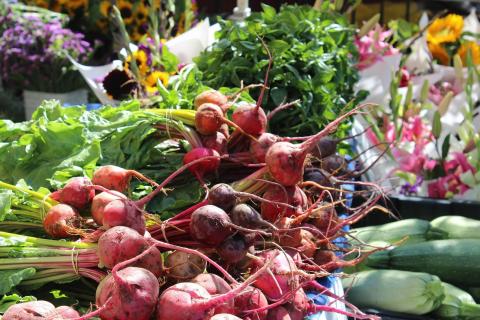Simple Tips for Longer Lasting Produce

Every year, Americans throw away 19% of vegetables and 14% of fruit they purchase. Storing your fruits and vegetables properly prevents throwing away dollars while keeping your refrigerator and kitchen stocked with delicious and nutrient-packed foods.
Produce to Refrigerate (make sure refrigerator is 40 degrees or below)
-Apples, Apricots, Berries, Broccoli, Brussel Sprouts, Cabbage, Cantaloupe, Cauliflower, Cucumber, Grapes, Green Beans, Honeydew, Kiwis, Lettuce, Mushrooms (in a brown paper bag)
Produce to NOT Refrigerate
-Avocado, Bananas, Garlic, Nectarines, Peaches, Potatoes, Squashes, Tomatoes, Watermelon
If you have visited your local farmers market or farm stand, you might notice some New Hampshire fall favorites like beets, carrots and squash. These are great to purchase in bulk due to their long shelf life, if stored properly. Below is a list of tasty fall vegetables and how to keep them fresh for weeks to months.
Beets: Remove the leaves (but keep them; they are great sautéed!) and leave two inches of stem attached to the root. Store the trimmed beets in a plastic bag in a dark and cool place, such as the drawer in your refrigerator. They are good for up to 7-10 days.
Carrots: Remove the leaves (again, keep them, they make a great addition to homemade pesto!) and store in a plastic bag in a dark and cool place, such as the drawer of your refrigerator. They will stay good for several weeks.
Onions: Best stored in a dry, dark and cool place. Avoid storing them in plastic or near potatoes. Properly stored whole onions will last for up to a month. If you are storing peeled and cut onions, keep them covered in the refrigerator for up to 7-10 days.
Winter Squash: Store in a cool, dark and dry location, such as a kitchen cabinet or dry part of the cellar. If properly stored, they will last for up to a month.
Potatoes: Store potatoes in a paper bag and keep them dry, cool and away from sunlight. Do not store with onions, and do not store in the refrigerator, as the cold temperature reduces quality. They will last for up to a month.
Leafy Greens: Wash leafy greens right before eating; washing before storing will cause them to spoil faster. Store in a sealed container or plastic bag wrapped in a damp paper towel.
Brussels Sprouts: Store in a paper bag or sealed container in the drawer of your refrigerator. If you purchase Brussels sprouts attached to the stalk, keep them on the stalk until you are ready to eat them, as it will help them last longer. They will last for about a week in the fridge.
Garlic: Do not store in a plastic bag; keep garlic bulbs in a mesh or paper bag to allow for proper airflow. Store at room temperature in a place that is dry and dark. Whole garlic will last for up to a month. Keep minced garlic covered in the refrigerator; it should last for 7-10 days.
For more information about freezing vegetables visit https://extension.unh.edu/resource/freezing-vegetables
For more information about storing produce visit https://www.eatright.org/ or https://fruitsandveggies.org/stories/storage-101/
